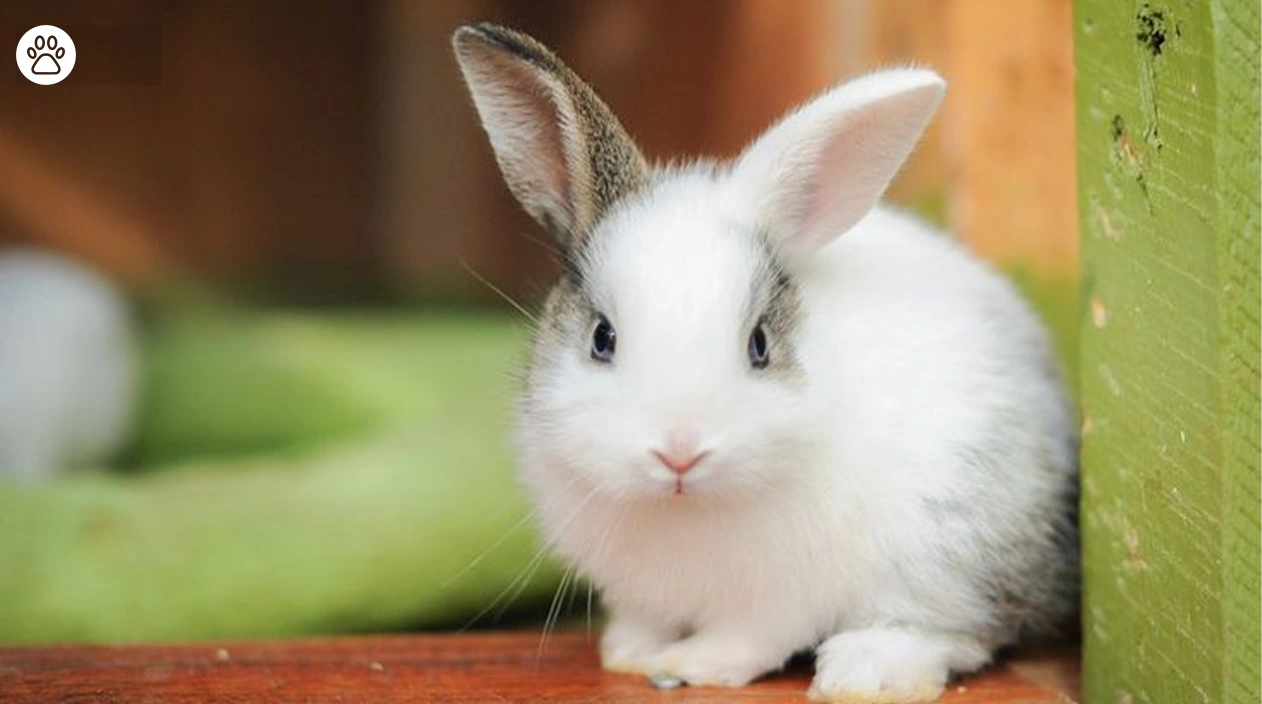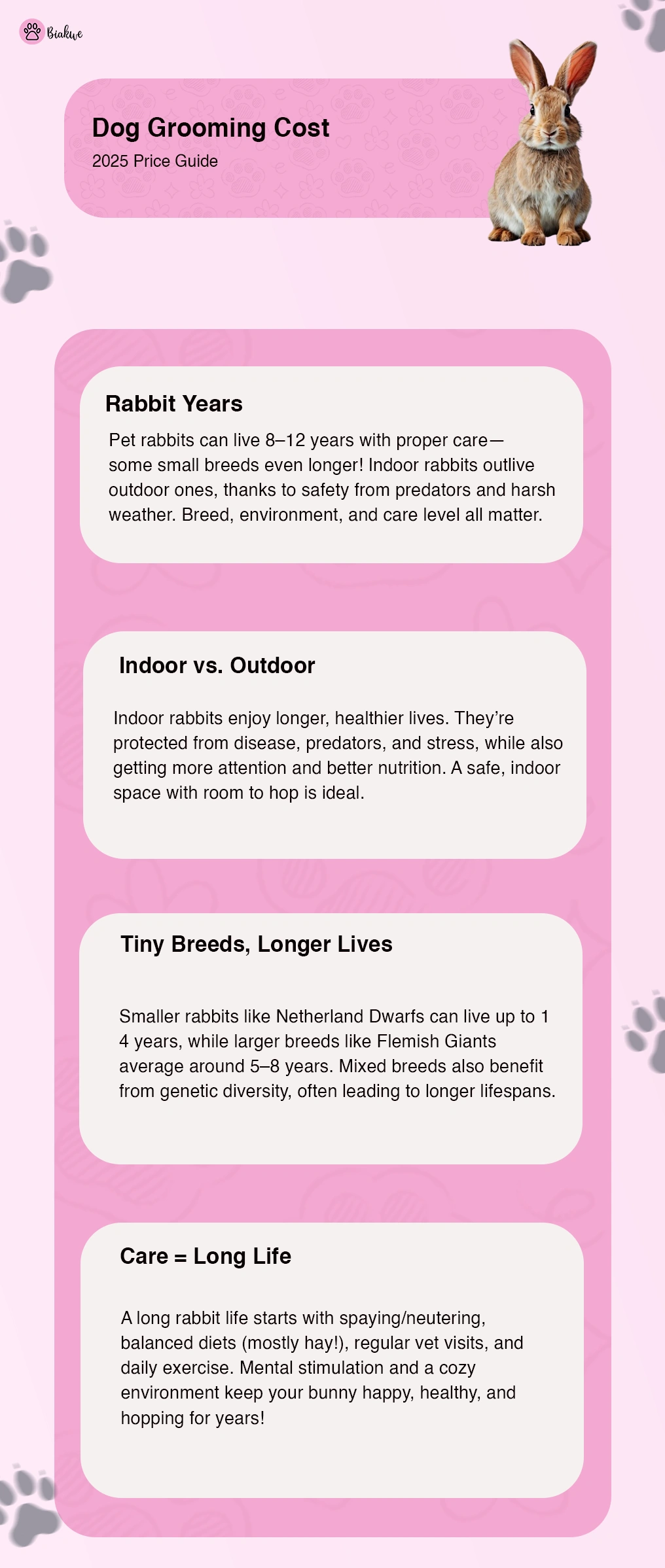The demand for rabbits as pets is high because they combine intelligent behavior, a sociable personality, and an energetic demeanor. Understanding rabbits’ natural life expectancy ensures successful long-term care and healthy life duration.
Rabbits that enjoy suitable living spaces, nourishing feed, and engaging activities live long lives and become cherished household pets. We will examine rabbit life expectancy and health factors that influence their lifespan while discussing the essential care practices for their wellness.
How Long Do Rabbits Live? Rabbit Lifespan
Domestic rabbit lifespans are influenced by breed, lifestyle, and type of care, but they are generally shorter than their wild cousins. Pet rabbits live on average 8 to 12 years, while dwarf breeds can live longer than this. Outdoor rabbits have shorter life spans of 3 to 5 years due to exposure to predators and environmental stressors. Indoor rabbits, on the other hand, live in a safer environment and receive regular care, enabling them to live the longest they possibly can.

See this blog: 5 Easy & Cheap Raw Dog Food Recipes for Beginners
Indoor Rabbit Life vs. Outdoor Rabbit Life
Indoor rabbits often have longer lifespans than those kept outside, which face more significant threats from predators, temperatures, and various diseases. Indoor rabbits are in a controlled environment where they receive frequent interaction, good nutrition, and resistance to stressors.
In addition, many adaptations in outdoor rabbits that would prolong their life span, like fluctuating temperature or limited supervision, can only give them a shorter life span outdoors. To maximise their longevity, rabbits should be kept indoors, as long as there is enough room for exercise.
Lifespan of Rabbit Breeds: Which Live the Longest?
Different breeds live longer or shorter. In general, small varieties such as Netherland Dwarfs, Mini Lops will have a longer life span (12–14 years) than larger varieties such as Flemish Giants (5–8 years). The improved genetic variety in mixed-breed rabbits results in a longer expected lifespan. By understanding the requirements of your rabbit’s breed, you can develop personalized care routines that optimize its health and lifetime.

Checkout this blog: A Complete Guide to Cockapoo Dogs: Everything You Need to Know
Factors Influencing Rabbit Lifespan
Proper care, nutrition and exercise are all factors that can influence rabbit lifespan. These are essential in providing a rabbit with a longer life by avoiding health problems and maintaining good health.
Importance of Proper Rabbit Care
Proper care is the backbone of a rabbit’s long life. Your rabbit will remain calm and healthy with appropriate veterinary visits, regular environmental cleanliness, and delicate petting routines. Pet owners must perform spaying and neutering procedures on these specific breeds of pets because these surgeries reduce female uterine cancer risks while promoting better general health outcomes.
Role of Nutrition in Longevity
Diet is a major contributor to your rabbit’s lifespan, so keep it healthy and balanced. Their diet should consist of high-quality hay and, only occasionally, veggies and pellets. Steer clear of sweets or processed treats that might result in obesity or dental issues. Regular access to fresh water is vital for their hydration and general health.
Click to see: Life with Siamese Cats: An Owner’s Complete Guide
Exercise and Mental Stimulation for Long-Living Pets
Rabbits are active animals and need room to run around and exercise daily. Allow plenty of space to exercise and include toys to keep them occupied mentally. Keep them preoccupied with tunnel exploring or chewing on safe items to prevent boredom-related anxiety. These mind-boosting activities fill them with joy and increase their lifespan.
When you consider factors such as breed-specific lifespans, high-level care routines, and the benefits of keeping them indoors, you’ll be able to give your rabbit the longest, healthiest life possible. With love and attention, these longevity beasts can be a beloved part of your family for years.

Spaying/Neutering and Its Impact on Health
Spaying or neutering your rabbit before age two will help extend its life duration to the maximum extent possible. Rabbits easily become prone to uterine cancer since an unspayed female has a 90% risk of developing it after turning two years old.
Spaying and neutering are also crucial for male rabbits to prevent health concerns and aggressive behavior, allowing good litter training. Not only does this procedure help eliminate the risk of potentially fatal diseases, but it also promotes a more relaxed, healthier pet.
Explore: A Guide to Black Smoke Maine Coons: Traits, Care and More
Creating a Safe and Comfortable Living Environment
Providing your rabbit with a safe and comfortable environment is vital for their health and well-being. Indoor rabbits are protected from this peril, harsh weather , and accidents, allowing them to live a much longer than outdoor rabbits.
The space should also be clean, and a soft bed should be provided to avoid foot sores. Rabbit-proof your house by eliminating dangers such as electrical cords and poisonous plants. An environment warm with love and free of stress is excellent for physical and mental health; a happy rabbit is long-lived.
Regular Veterinary Checkups
Routine veterinary care is essential for your rabbit’s health. Regular checkups every six months will help monitor their overall condition and catch tests like fecal exams or ear-cleaning before they become an issue. Rabbits’ dental health is critical, since their teeth can overgrow and cause eating difficulties and other issues.
A rabbit-knowledgeable vet can also offer advice on diet, vaccinations and preventive care to fit your pet. Rabbits require regular medical attention so they can live long, healthy lives.
Why Rabbits Are Ideal for Families Seeking Long-Term Companionship
Rabbits serve as excellent, continuous companions for families who seek animal companionship. Indoor rabbits under correct care typically survive 8–12 years or longer, which equals the lifetime duration of cats alongside small dog breeds. These animals have three highly valued traits: gentleness, intelligence, and strong interpersonal connections.
Moreover, stray dogs require less attention than larger pets, an incredible advantage for households caught up in a hurricane of lifestyles and making them an excellent choice for neighborhoods.
How Rabbits Compare to Other Small Pets in Lifespan
According to general pet care standards, rabbits live longer than the typical lifespans of hamsters, gerbils, and guinea pigs. The correct care of rabbits allows them to survive more than ten years, but hamsters typically reach their life span at 2-3 years, and guinea pigs survive for about 5-7 years. Rabbits tend to be longer-lived and more social animals than other mammals. They are also very adaptable as indoor pets and easily trained to be long-term furry friends.
Rabbits can live to be over eight years old with a carefully constructed household (castration, make sure they are safe, off to the vet, quirky and special) and become welcome family members.
Conclusion
Last, ensuring your bunny lives a long life is possible with proper care, spaying/neutering, etc, and regular check-ups. With lifespans exceeding a decade as beloved pets, rabbits provide transformational companionship, making them an ideal choice for families after lasting connections. By knowing what age the average rabbit can live to and how to provide the best conditions, your furry friend will live happily ever after, a real part of your family.
